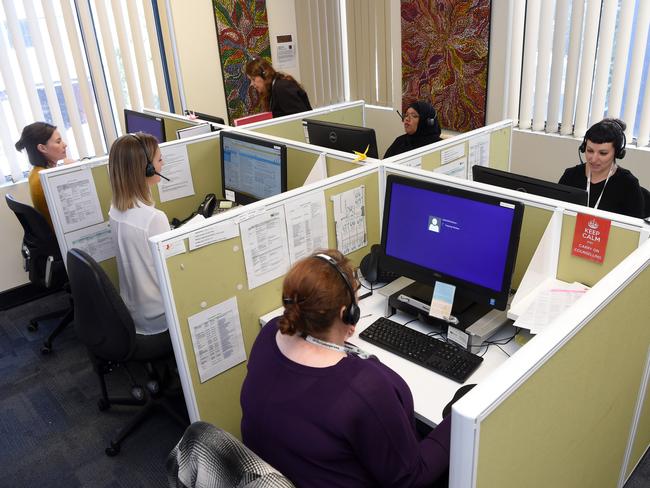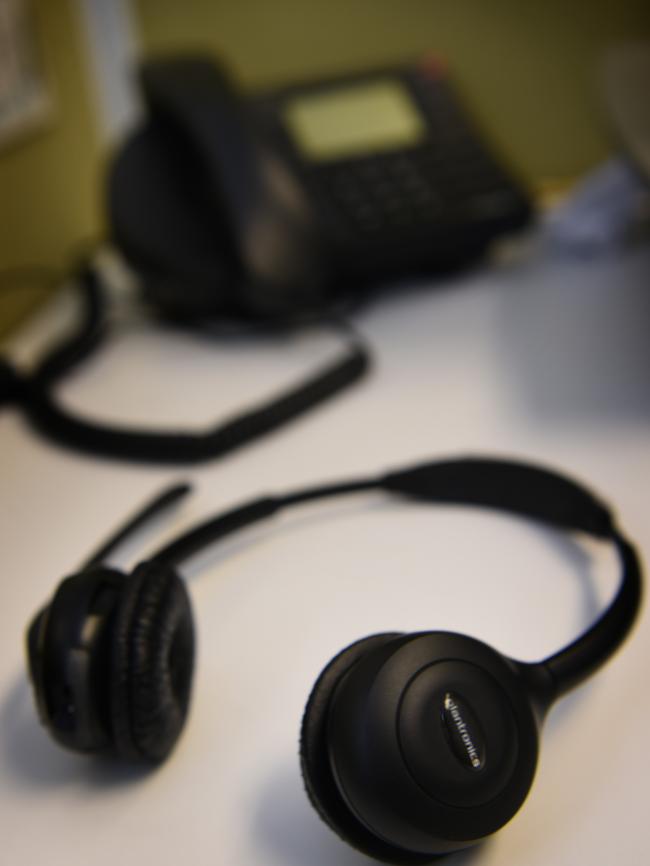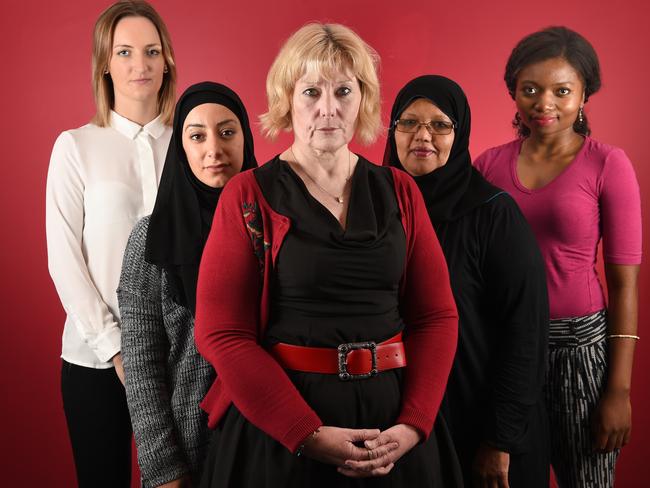A day at Safe Steps domestic violence call centre
IT LOOKS like any other office except the team inside have taken calls from 60,000 domestic violence victims in the past year. And every call, no matter the severity, is important.
VIC News
Don't miss out on the headlines from VIC News. Followed categories will be added to My News.
IT looks like any other office.
Fluorescent lights, cream walls, few windows and some indoor plants.
There’s a maze of wall partitions that leads to a hall and a nondescript door that looks the same as all the others.
It opens to a pokey room with six call-takers sitting at six square desks.
On the wall beside them hangs a large whiteboard, divided into 20 even squares.
And above each is the name of a motel somewhere in Victoria secretly housing the women whose names are listed underneath.

There’s a pile of papers on the desk closest to the whiteboard with a sheet on top that tells a story these workers hear every day.
The woman called just a few hours ago from her home in Melbourne’s southeast.
She shares that home with her partner and she fears he’s going to kill her.
“Some stories make your blood boil,” the Safe Steps family violence worker says as she swivels on her chair to grab the top paper from the “high risk” pile.
“This one just came in this morning.”
“Weapons”, “drugs” and “murder” are common words littered through this file.
In a few thin pages it gives a brief history of a decade-old relationship in which a woman feels trapped with a partner who abuses her, steals from her and has cut ties with her family and friends.
All she has is him, and he has guns and a temper.
The police have urged her to get out, but they didn’t tell her how.
And she believes that one day, maybe soon, he will come through on his threats to kill.
This story is just one of 60,000 calls made this past year alone.
“We have stuff you can’t even imagine,” the worker says.
Like the young woman whose boyfriend stood her in front of a tree and used her body for shooting practice.
Or the woman beaten so badly she was admitted to hospital, only for the man who put her there to come into the ward during visiting hours and rape her.
“Nowhere is safe,” the worker says as she takes another call.

Down the hall from the angels on the frontline busily taking calls, chief executive Annette Gillespie sits at a small round table near the door of her cramped office.
It’s been a long few weeks with the winding up of the Royal Commission into Family Violence and the State Government’s promise to take on all 227 recommendations.
Calls have started to flood in.
It happens every time domestic violence gets attention in the newspaper or on TV.
Women see the stories and finally feel confident enough to tell theirs while others fear more attention in public will mean more violence behind closed doors.
“It’s 24/7, every day of the week, all year, it’s the same,” Ms Gillespie says. “We need to triple our service just to meet demand today.”
Numbers fall easily from Ms Gillespie’s lips. Sixty thousand — the calls in the past year. Five thousand — the extra calls from the year before. Thirty — the number of calls every day from women who have never sought help.
First-time callers have different reasons for picking up the phone, but there’s one case burned deeply into Ms Gillespie’s mind.
It involved a man and his wife and a secret kept from everyone they knew.
He was a great guy, a “real catch”, who went to work every day and was well liked by his colleagues and friends.
Her family thought he was great too because she told them all the time.
When guests came for dinner at their rural Victorian home she always looked perfect. She’d spend hours getting ready. She’d shower, do her hair and her make-up. He would iron her dress.
And when they welcomed guests through the front door of their picture perfect home with picture perfect smiles, they never would have guessed she had been chained to a pole in the shed just hours before.
Shackled by the wrists, she would cower naked in the shed while he beat her, taunted her, called her names. “Imagine if your family could see you now,” he would spit.
And as if to test his power, he would call her family and hold the phone to her ear, “Tell them how great I am”.
And that’s where he left her, chained like a dog in the shed, for hours or even days.
If he needed her, he would release her.
If they had guests he gave her enough time to get ready, and when those guests arrived what they saw was the husband they had long heard about, a great man.
So that’s what they believed.
One day, her fear of someone finding out overtook her fear of him and she picked up the phone and called for help.
It had been going on for 20 years.

THERE are people who believe fighting domestic violence isn’t worth the time or the money.
But the numbers beg to differ.
Last year, 37 women were murdered in Victoria.
Some of them Ms Gillespie knew.
“Where the community really struggles is with this concept that people who live next to them, who they work with, go to sports with, are the same people causing this level of harm to people they claim to care about,” she says.
“It’s just so unfathomable to the community that people do this in a planned way.
“And it’s relentless, they’re not exceptions to our service, they are everyday calls for help.”
Over on Spring St, the minister tasked to end this violence sits in a dark booth of a restaurant in Parliament House.
Fiona Richardson has not been well.
In the midst of the biggest challenge of her political career — the Royal Commission report and going public with her own history of family violence — the Prevention of Family Violence Minister came down with a virus.
Yet, she sits in a timber booth with the Herald Sun for more than an hour to discuss how she plans to beat the scourge, a mild cough breaking up her sentences.
It’s a personal fight as well as a professional one.
When she was a baby, her alcoholic father almost killed her older brother. Aged just 6, he hit the floor like a bag of spuds.
Years later her mum packed her and her two brothers into the car and drove them from Sydney to a refuge in Melbourne.
Ms Richardson wants this year to end with fewer than 37 women lost to violence. Much fewer.
“I’m optimistic, because it’s possible,” she says, stating that family violence services are “critically important” to achieving it.
“Right now, family violence and supporting family violence specialist services is a key priority.”
The Government has announced a half billion dollar commitment to address family violence and an extra $2.1 million for Safe Steps on top of its $2.9 million budget.
But Ms Richardson concedes “more can always be done”.

AWAY from Spring St, the politics, the press conferences and funding announcements, a small team of angels answers 170 calls from women each day at a little office tucked away in a corner of Melbourne’s north.
And every call, no matter the severity, is important.
The workers on the front line don’t distinguish between horrific stories of brutality or those that seem small, like suggesting what to wear or that a certain friend is no good anymore.
Because these stories are similar — they are all about control.
And for these workers, every woman’s story on that continuum is important to change.
As the Herald Sun leaves the crowded offices of Safe Steps, through the rabbit warren of desks, down the hall lined with plants and to the front door with security access, the call-takers wave goodbye from their nooks and go back to work.
The Safe Steps Candlelight Vigil for those lost to family violence will be held at Federation Square on Wednesday (MAY 4) at 5.45pm
If you need help, call 24/7 family violence response on 1800 015 188, family violence counselling on 1800 RESPECT or MensLine on 1300 78 99 78.


